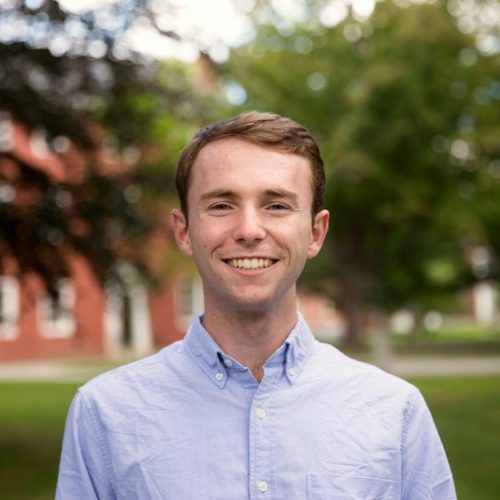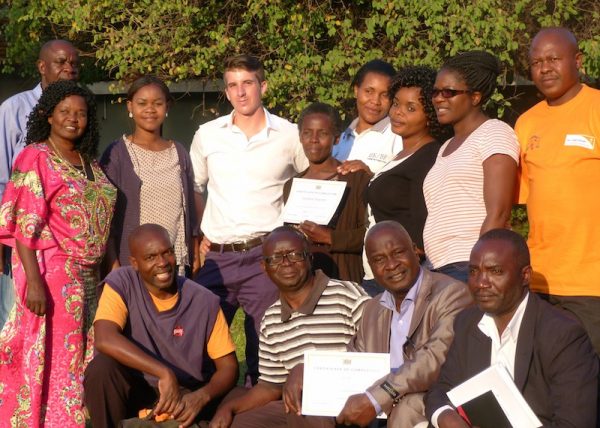Brendan Pulsifer ’20 Receives Grant to Assist Grad’s Health Work in Zambia
By Rebecca GoldfineIn his first semester at Bowdoin, Brendan Pulsifer ’20 went to hear a campus talk by Lonnie Hackett ’14, who was speaking about his healthcare organization, Healthy Kids/Brighter Future, which he started up in Lusaka, Zambia, while he was still an undergraduate.

In Zambia, although ninety percent of children register for school, almost half drop out before completing grade seven, and a third regularly suffer from illness that disrupts their education. Healthy Kids/Brighter Future is trying to improve children’s health, and school performance, by making it easier for them to access healthcare. It’s doing this in part by training select teachers to provide health education and basic medical care, in schools, to thousands of children who live in the poor outskirts of Lusaka. Since its founding, HK/BF has grown to include thirteen Zambians and one other Bowdoin alumnus, Sam Eley ’15.
After hearing Hackett’s presentation, Pulsifer knew he wanted to get involved in HK/BF. He approached Hackett after the talk, and the next summer, he was in Zambia. “I’ve always been interested in medicine, not just in the microbiology of it but also in the public health and public policy aspects of it,” Pulsifer said, adding, “I always knew I wanted to do something that would make a real change.” The sophomore has declared a biochemistry and government double major, and wants to study both medicine and public health after he graduates from Bowdoin.
Projects for Peace
Since 2007, fifteen Bowdoin students have received Projects for Peace grants from the Davis Foundation. Bowdoin’s Career Planning office helps facilitate the grants.
2007: Mo Zhou ’09, Multi-Ethnic Education in China
2008: Steven Bartus ’08, Anna Karass ’08, and Aisha Woodward ’08, Maine-Ghana Youth Network Film Project
2009: Angel Cheng ’12, The Voice of Forgotten Mothers
2010: Michael Barish ’11 and Mark Oppenheim ’11, Prescriptions for Peace
2011: Mariya Ilyas ’14, Words for Peace
2012: Kristopher Anthony Klein ’12, Classrooms for Peace
2013: Apekshya Prasai ’16, Pariwartan
2014: Lonnie Hackett ’14, A Healthier Peace: Providing School-Based Health Services to Children
2015: Scott Mitchell ’15, Stand for Peace: Combating Childhood Disability in its Early Stages
2016: Caroline Martinez ’16, Fostering Female Indigenous Leadership
2017: Aneka Kazlyna ’20, Empowering young girls in rural villages by teaching them Computer Science
Pulsifer used his Bowdoin Faculty Scholarship to fund his 10-week trip to Zambia last summer. During his time, he began crafting a curriculum to teach young girls about reproductive health, basing the program’s lessons on information he gathered from school administrators, clinicians, government workers, community members, and female students. This foundational work set him up to return this summer and implement the curriculum.
Now, Pulsifer has received a $10,000 grant from Davis Projects for Peace to fund his work. With the $7,000 left over after his travel and living expenses are covered, Pulsifer will help support Zambian teachers and nurses teach an eleven-week course to girls ages ten to fifteen. The after-school program will cover a range of topics, from gender roles and gender violence, to pregnancy, puberty, HIV, and human and sexual rights. The course will also include a lesson on how to make reusable, inexpensive hygienic pads to help girls attend school during menstruation.
“We go through gender roles and goal setting, what it’s like to be a girl in Zambian culture, and what expectations are put on you and how to feel supported,” Pulsifer said, talking just about the first two classes. “My favorite part of this is how to access resources, so if you ever have a problem, you can go to your teacher, you can go to the clinic, because we have these resources here for you.”

These kinds of topics are sensitive, in any culture, and in Zambia they’re enough of a taboo that they’re typically not taught in schools. But girls suffer as a result, according to Pulsifer. “Problems with sexual and reproductive health are pervasive in Zambia,” he writes in his Davis application. Girls struggle to afford sanitary materials, overcome trauma from gender-based violence, and access contraceptives, leading to missed school days and a 45-percent primary school dropout rate for girls. “Widespread gender inequality leads to lower rates of education for females than males and higher rates of HIV/AIDS for females than males,” he continues. “Furthermore, 43 percent of Zambian girls over the age of 15 have experienced domestic violence, one of the highest rates in Africa.”
Some of the grant money will also be used to train teachers on how to respond to girls who come to them with problems or worries. Pulsifer said while he is helping to oversee the program, he won’t be doing the teaching himself — on purpose. These lessons are better conveyed by local people who understand the culture, he said.
Hackett said he’s pleased Pulsifer is returning this summer. “I’ve been impressed by the way Brendan committed himself to the work. We are all excited to have the opportunity to pilot a reproductive health program. I believe it will be a significant contribution to the wellbeing of our students,” he said.
He added, “I first traveled to Zambia as the result of an opportunity provided by Dr. Richard Bail ’64. It‘s wonderful to be able to provide a similar opportunity to another Bowdoin student.”